
Matthias Glasner’s Dying was the winner of the top prize at this year’s German Film Awards, clinching the Golden Lola in the best film category along with a cash prize of €500,000 (USD 538,095) for the producers to invest in a future project.
The production by Port au Prince Film & Kultur Produktion, Schwarzweiß Filmproduktion and Senator Film Produktion, which had its world premiere in competition at this year’s Berlinale where it won the best screenplay Silver Bear, also garnered another three statuettes: Corinna Harfouch (best lead actress), Hans-Uwe Bauer (best supporting actor), and Lorenz Dangel (best film score).
Glasner’s family drama, which is being handled internationally by The Match Factory, had been this year’s hot favourite after it received nine nominations from the German Film Academy ahead of the weekend’s gala ceremony in Berlin attended by around 1,6000 guests including incoming Berlinale director Tricia Tuttle.
The Silver Lola in the Best Film category – with a cash prize of €420,000 (USD 453,000) – went to the German-Austrian co-production of Adrian Goiginger’s The Fox, while the Bronze Lola carrying a cash prize of €370,000 (USD 398,190) was presented to Ayşe Polat for her mystery thriller In The Blind Spot.
The Fox is based on the true story of Goiginger’s great-grandfather’s unlikely friendship with a wounded fox cub at the beginning of the Second World War. Simon Morzé beat off competition from Lars Eidinger and Marc Hosemann to take home the Lola for best lead actor.
Polat picked up statuettes in the best director and best screenplay categories for In The Blind Spot. Accepting the Lola for best screenplay, the German-Kurdish filmmaker dedicated her prize “to all women who courageously fight for justice and freedom”.
Polat continued, “New narrative forms are important because they help to strengthen empathy, which is something we especially need right now. So, it’s important that we don’t focus on what divides us, but focus on what connects us.”
The Lola for the best children’s film went to Soleen Yusef’s Winners which had been the opening film of this year’s Generation Kplus section at Berlinale. The production by DCM Pictures and Boje Buck Produktion is the latest addition to Pluto Film’s sales line-up for the Marché du Film in Cannes next week.
Meanwhile, the Lolas for best documentary and best editing were presented to Steffi Niederzoll’s Seven Winters In Tehran, the true story of the Iranian student Reyhaneh Jabaari who was executed in 2014 for killing the man who tried to rape her.
Timm Kröger’s debut feature The Universal Theory picked up three statuettes for best cinematography, best production design, and best visual effects.
Lasting almost three hours, the ceremony at the Theater am Potsdamer Platz had delivered emotional high points.
The 102-year-old Holocaust survivor Margot Friedländer was accompanied on stage by the journalist and human rights activist Düzen Tekkal and director Wim Wenders to make an urgent appeal to the assembled film community to fight the current surge in far-right extremism in Germany
“When I came back [to Germany] 14 years ago, I could never have imagined what is now going on in the public sphere. That’s how it started back then,” Friedländer said. “There are a lot of storytellers in this room. you have a responsibility to use the power of film to make sure it never happens again.”
And when the team of Seven Winters In Tehran walked on stage to accept the Lola for best documentary, they were accompanied by Reyhaneh Jabaari’s mother Shole Pakravan who, like Friedländer, received a standing ovation when she urged everyone to join the fight to stop executions in Iran.
Meanwhile, the legendary German actress Hanna Schygulla (Lili Marleen, The Marriage Of Maria Braun) provided some unexpected light relief for the audience when she didn’t show any sign of coming to a close with her speech after accepting her Honorary Lola from the hands of the former Berlinale director Dieter Kosslick.
Among the awards ceremony guests were state minister for culture and media Claudia Roth, who provided the prize-money totalling almost €3m (USD 3.2m) for the 17 categories, as well the German Oscar nominees Ilker Çatak and Sandra Hüller, Leonie Benesch, Maria Schrader, and Veronica Ferres.

























No comments yet